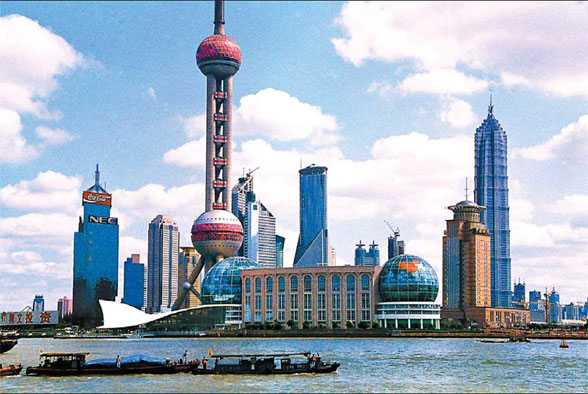Shanghai one step closer to financial center dream
Updated: 2008-01-14 10:24

The stock market boom last year put Shanghai in the map of world markets, but that's only half the story of the journey the city has embarked on to emerge as a global financial center to rival New York and London.
While the world was fixated on the bulls and bears in the Shanghai stock exchange, the city made great strides in its quest of this global status, from playing host to international banks to expanding its commodities market, with the China Financial Futures Exchange putting the final touches for the launch of the mainland's first index futures contract.
In November, Shanghai Mayor Han Zheng laid down the road map for the international financial center goal: put in place the necessary infrastructure by 2010 and achieve the status by 2020. To that end, the municipal government has established a high-profile task force headed by the mayor.
An international consultancy committee has been formed under the task force with powerful figures in the financial sector to guide the authorities. These include central bank chairman Zhou Xiaochuan, former World Bank president James D Wolfensohn, Nobel laureate Joseph Stiglitz and leaders of China's banking, securities and insurance watchdogs as well as senior executives of financial institutions.
"Getting the initiative moving, including the setting up of the task force, is one of the most significant steps made by Shanghai in 2007 to become an international financial center," says Lu Hongjun, chairman of the International Financial Centers Association.
"The year 2007 saw more integrated moves by the central and local governments on the ambitious plan, which was raised to a much higher national strategic level," says Lu, who also serves as the president of Shanghai Institute of International Finance.
Shanghai's capital market saw rapid development last year. The Shanghai Stock Exchange (SSE) now ranks sixth in the world and third in Asia in terms of market capitalization. Its total market capitalization soared to 25 trillion yuan, while the annual turnover increased nearly 400 percent to 28.57 trillion yuan ($3.93 trillion) by the middle of December. There are 857 companies listed on the Shanghai exchange, 822 of which have completed share reforms, accounting for 96 percent of the total market capitalization.
Geng Liang, chairman of SSE, says the exchange is entering an important period of development. "We will strive to build the stock exchange into a more standardized and open world-class bourse. We aim to cultivate the blue-chip market."
Thanks to the booming stock market and the red-hot Chinese economy, 855 companies listed on the exchange posted a 73.8 percent increase in net profit to 512.3 billion yuan in the first nine months of last year, surpassing 320.2 billion yuan for the whole of 2006. The aggregate revenue of these 855 companies rose 43.7 percent to 4.35 trillion yuan.
Following the China Securities Regulatory Commission's call to prevent irregularities, SSE released new rules for stock trading in September to curb insider trading, excessive speculation and price rigging.
The exchange launched a new index on the governance of China-listed companies on January 1, the first to evaluate corporate governance in the country. Zhu Congjiu, general manger of SSE, says: "We will take measures to improve corporate governance, and it's a long-term task."
SSE is now stepping up efforts to create a more diversified market, improve the market's money-raising capacity and speed up the development of the fixed-income security market, including corporate and national bonds.
|
||
|
|

